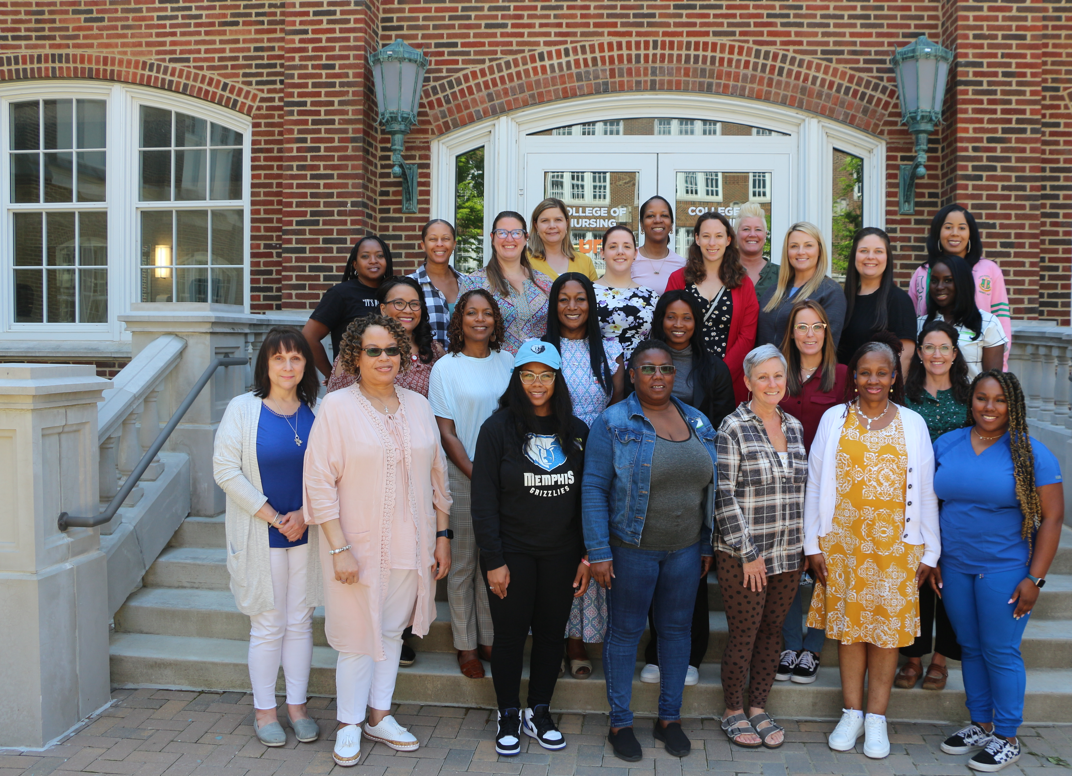Sickle Cell Nursing Boot Camp
The Sickle Cell Boot Camp to Promote Nursing Excellence Nationally and Globally Utilizing a Train the Trainer Model addresses the critical need for specialized education and training for nurses who care for sickle cell patients.
Sickle Cell Disease (SCD) affects 100,000 people in the U.S., but education about the disease in nursing schools is limited. To address the gap, a pilot Sickle Cell Boot Camp for Nursing Excellence was offered in 2022 with funding from a $50,000 grant from Global Blood Therapeutics, Inc (GBT). Since then, five boot camps have been held - the most recent of which was in September 2025, thanks to funding by the USDA Delta Health Care Services and the Health Resource and Services Administration. This effort is a collaboration of the UT Health Science Center College of Nursing, St. Jude Children's Research Hospital, and the International Association of Sickle Cell Nurses and Professional Associates (IASCNAPA).

Approximately 35 students from around the country attended the 2025 Sickle Cell Boot
Camp to Promote Nursing Excellence.
Program Overview and Goals
The Sickle Cell Boot Camp to Promote Nursing Excellence Nationally and Globally Utilizing a Train the Trainer Model was most recently held Sept. 8-12, 2025 at the UT Health Science Center College of Nursing in Memphis and St. Jude Children's Research Hospital. The program included all the information provided in the original 2022 Nursing Boot Camp. But it was expanded to include the Train the Trainer Model to empower nurses to become SCD nurse educators at their institutions.
Implementation. The comprehensive curriculum for the Sickle Cell Boot Camp to Promote Nursing Excellence includes a patient panel, as well as a focus on theory and clinical skills. The curriculum integrates the cornerstones of nursing education, including evidence-based practice, skills, attitudes, and values. A lifespan approach explores age-based disease complications progressing from birth to adulthood. Current evidence, best practices, and critical analysis skills are also taught.
Adapting a Train the Trainer Model. Train the trainer content that focuses on adult learning principles is incorporated throughout the five-day boot camp.
Development of Teaching Materials for Trainers. A condensed version of the Sickle Cell Boot Camp to Promote Nursing Excellence content is provided to graduates. Content includes the essential components of the care of sickle cell patients along with theory and clinical skills. Content includes learning objectives for each section, review questions for the participants, and learning activities. The trainers also receive videos developed by the Sickle Cell Planning and Curriculum Committee to teach assessment skills and early recognition and treatment..
Support a Core Group of Trainers. Follow-up support to trainers is provided to strengthen the transfer of sickle cell theoretical content and clinical skills and support their teaching efforts. Follow-up support includes online meetings to talk about the trainer’s progress with teaching the content, answer questions, provide additional teaching materials if needed, and discuss any obstacles they have encountered with implementation. In addition, attendees are required to engage in follow-up activities for a minimum of 12 months upon completion of the boot camp. These activities may include periodic phone calls or Zoom meetings to discuss how participants have applied and shared the knowledge gained during the bootcamp.
Learn more about the course curriculum and agenda.
Application and Eligibility
Who: This program is geared to nurses and nurse practitioners who provide care and develop
nursing policy for patients with SCD, including bedside and clinic nurses, nurse managers
and administrators, and nurses in academia with a focus on SCD. Applicants must be
registered nurses actively involved with the SCD patient community. Applicants must
work in the U.S.
What: This is a five-day, in-person, interactive event. Participants are required to attend
all five days. Please don't apply if you cannot attend the entire boot camp. Space is limited.
When: The most recent boot camp was held Sept. 8-12, 2025.
Where: UT Health Science Center College of Nursing and St. Jude Children's Research Hospital
in Memphis, TN.
Cost: This is free to participants. Transportation, food, and lodging will be provided
for out-of-town participants in the nursing bootcamp.
Application Checklist:
- Have a copy of the RN license ready to upload.
- Prepare a statement about “Why I want to participate in the SCD Nursing Bootcamp."
Student Testimonials

This group of 25 nurses came to one of the boot camps from institutions including Johns Hopkins Hospital, the Cleveland Clinic, the Ann & Robert Lurie Children's Hospital of Chicago, and St. Jude Children's Research Hospital.
Evaluation Comments
- “You all filled me back up, and I am brimming with motivation, excitement, and renewed spirit for our collective work.”
- “This week was truly electrifying, from listening to the patient panel to everyone's wonderful presentations and all the insightful discussion! I feel so privileged and grateful to have you all as friends and colleagues in the fight to improve care of sickle cell. This is only the beginning.”
- “All the presenters have been very helpful in helping us understand sickle cell. The interaction among the group is amazing.”
- “I cannot wait to do all I can to make the lives and outcomes better for these patients.”
- “Although we have our work cut out for us to impact change for the sickle cell population systemically, by meeting and interacting with each of you, I am confident that we will definitely, positively improve sickle cell patient care and patient outcomes.”
